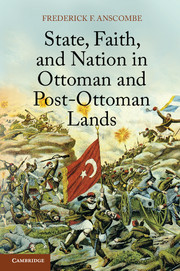Book contents
- Frontmatter
- Dedication
- Contents
- List of Maps and Images
- Acknowledgments
- Transliteration and Abbreviations
- Maps
- Introduction
- Part I The Ottoman Empire
- Part II From Ottoman to Post-Ottoman States
- Part III Contemporary Post-Ottoman States
- 9 The Contemporary Balkans
- 10 Contemporary Turkey
- 11 Contemporary Arab Countries
- Conclusion State, Faith, and Nation
- Bibliography
- Index
- References
9 - The Contemporary Balkans
Published online by Cambridge University Press: 05 June 2014
- Frontmatter
- Dedication
- Contents
- List of Maps and Images
- Acknowledgments
- Transliteration and Abbreviations
- Maps
- Introduction
- Part I The Ottoman Empire
- Part II From Ottoman to Post-Ottoman States
- Part III Contemporary Post-Ottoman States
- 9 The Contemporary Balkans
- 10 Contemporary Turkey
- 11 Contemporary Arab Countries
- Conclusion State, Faith, and Nation
- Bibliography
- Index
- References
Summary
To some extent, the Second World War in the Balkans took the gloss off post-Ottoman visions of the nation, its destiny, and its historic homelands. The right-wing nationalist regimes that had ruled in most of the post-Ottoman countries in almost-unbroken continuity since the achievement of independence either crumbled before Axis invaders and made little effort to resist brutal occupation (Serb-dominated Yugoslavia, Greece) or joined the ultimately losing side, suffering yet again national pain and humiliation (Bulgaria). The humbling of the nation eased the rise of the Left, in part because the left organized the only serious resistance to occupation (Greece, Yugoslavia, and Albania) and in part because socialism offered an ideology directed to addressing the needs and interests of the majority of the population in all of the post-Ottoman Balkans who had been practically ignored by previous regimes, with a few exceptions such as Bulgaria’s Agrarian Union government of Stamboliski. In lands where the proletariat was too inconsequential to justify Marxist-Leninist rule, postwar regimes did not fight against established national identity (except in Yugoslavia) but rather sought to reshape it to meet regime needs for legitimacy. The peasant and working classes became the embodiment of the nation, and the nation became effectively limited to those classes contained within each country’s borders. “Iron Curtains” separating the Warsaw Pact, NATO, Yugoslavia, and Albania made borders unchallengeable. The nation thus still existed in public life and the popular mind, keeping it ready to step into the vacuum created by collapse of the Soviet Union and its satellite system.
- Type
- Chapter
- Information
- State, Faith, and Nation in Ottoman and Post-Ottoman Lands , pp. 224 - 253Publisher: Cambridge University PressPrint publication year: 2014



